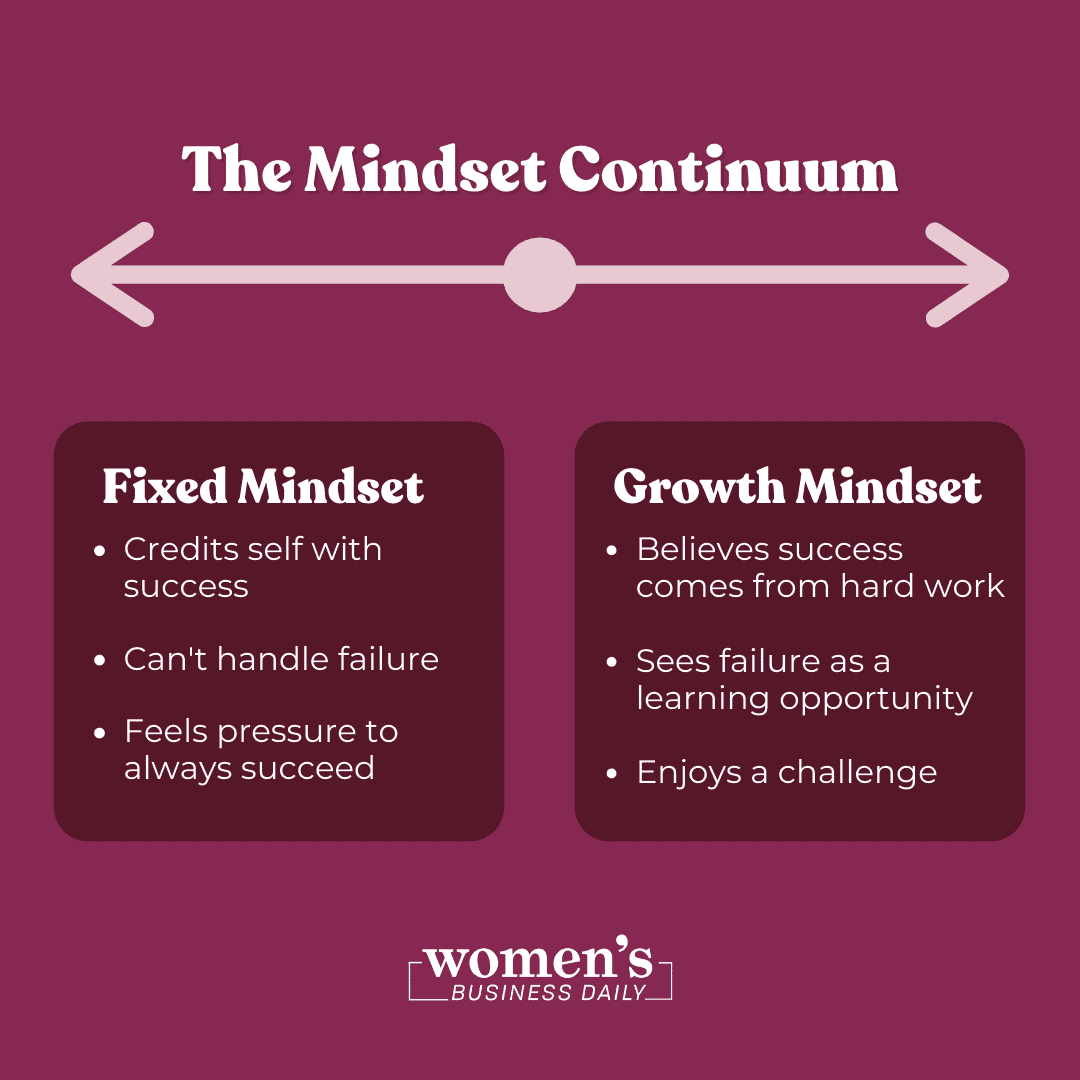What Is a Growth Mindset?

You’re a high-achieving businesswoman always wondering how you can improve, adapt, and overcome any challenges in your wake. It’s important to always continue your education, stay mindful of the latest trends in business, and stay on top of the competition. But it’s perhaps more important to possess a growth mindset.
A growth mindset can help you overcome failure, work harder, and try new things. Here are the best ways you can incorporate the research of Carol Dweck and her work on growth mindset psychology into your daily life.
The Foundations of the Growth Mindset
The concept of the growth mindset comes from researcher Carol Dweck. She works at the intersection of the fields of developmental psychology, social psychology, and personality psychology to develop her theories.
According to Dweck and her colleagues, people are placed on a continuum between a fixed and a growth mindset. These mindsets are based on where someone believes their talents and intelligence comes from. Someone with a fixed mindset believes that their abilities come from innate skill, whereas someone with a growth mindset believes they developed their abilities through hard work and persistence.

These mindsets have a broader implication than whether or not someone believes they are naturally gifted; Dweck posits that someone with a growth mindset will live a happier, less stressed, and more successful life than someone with a fixed mindset.
Since someone with a fixed mindset believes that their skills come from who they are as a person, when they fail, they panic and see it as a moral failing of their character. If they aren’t the smart successful one, who are they?
As a result, they do not overcome failure well, so they avoid anything that could challenge them. This leaves them stagnant and unable to grow.
Someone with a growth mindset knows that with hard work, they have the ability to overcome challenges. They are drawn to problems because they know that failure leads to learning and developing solutions is a fun test of their intellect. They have higher rates of tenacity and aren’t completely undone by failure. As a result, they’ll develop any innate abilities they have through study, trial, and error, and will see setbacks as opportunities, which make them stronger problem solvers.
Examples of the Fixed and Growth Mindsets
Does this seem too conceptual? Let’s take a look at an extended example to bring this psychology to life.
Let’s follow the two paths of Leah and Khadijah.
Leah and Khadijah were raised in two different and very loving households. As Leah grew, she was always praised for her intelligence, especially when she brought home good marks from school. Khadijah’s parents always praised her for finding solutions. She loved helping her dad figure out crossword puzzles and loved to try brain teasers with her sisters. Khadijah also did well in school, but her parents were truly proud when she participated in things like the science fair, where she came up with new ideas to combat climate change.
In high school, Leah was afraid to hurt her 4.0, so she elected to take the regular track of English 11. Khadijah heard that English 11AP was a real challenge, and the teacher was a difficult grader. She knew her GPA would take a hit, but she really wanted to grow as a writer, so she took the course.
When it came time to pick colleges, Leah looked better on her transcript, but Khadijah had an amazing college essay – which she asked her English teacher to look over – that talked about all she had accomplished and had to overcome in response to failure.
Both girls head off to different colleges. Leah chooses to pursue engineering because she’s always gotten really good marks in math and science. Khadijah also chooses engineering, because she has always wanted to develop a more affordable hospital bed for people who need medical care at home. She watched her grandmother struggle towards the end of her life, and she wished she could have passed at home; instead, she suffered alone in a hospital, because they couldn’t afford all the equipment they would have needed at home.
Leah sticks to her classes and studies so that she gets good grades. Khadijah also works hard in her classes, but she also joins all the engineering clubs, spends extra time in the labs, and has her professor sign off on her having an apprenticeship at a local hospital so she can study their methods and techniques.
Khadijah does well in the classroom, but she feels that working towards her goal and getting real-world experience is more important.
When Leah gets a B+ in her Advanced Calculus class, she doesn’t know what to do. She just completely ruined her 4.0. What will her parents say? She’s supposed to be the smart one. How is she supposed to recover from this?
They both graduate, Leah with honors and Khadijah with a wealth of experience and a prototype for her first low-cost hospital bed. She gets funding and begins work with a start-up whose mission is to make medical care and equipment more affordable.
Leah gets an internship at a local engineering firm, and for the first time, really starts to work in the engineering field. She starts to realize that maybe engineering isn’t actually for her. She worked so hard and got good grades, but when it comes down to it, she realizes she made choices based on superficial things, not where her true passion lies. She doesn’t know what to do next.
Who had the growth mindset and who had the fixed mindset?
How to Improve Your Own Mindset
If you read the examples and found that you aligned more with Leah, don’t worry! Realize that where you are is a starting point and you can always work your way along the continuum to have more of a growth mindset.
Whatever mindset you have has nothing to do with the amount of intelligence you possess; it’s all about how you approach problems, handle failure, and where you credit your success.
Students with a growth mindset realize that abilities can be developed, so they don’t choose what they’re innately good at; they choose what they’re passionate about. Students with fixed mindsets are going to choose paths that almost guarantee success. Why try something new when you’re terrified of the prospect of failing?
In order to adopt a mindset that aligns with the psychology of success, evaluate:
- Where you believe your basic qualities come from. Do you think you have fixed traits given to you when you were born, or do you think your basic qualities, such as your talents and intelligence, come through hard work?
- How you feel about a challenge. When you are presented with a problem, do you start to panic, or are you excited to try something new?
- How you handle failure. Do you see failure as a personal shortcoming, or do you see it as an opportunity to learn and grow?
Your answers to these questions will help you gauge where on the spectrum between fixed and growth mindset you land and how you can move closer to a healthy growth mindset.
Becoming the Best You That You Can Be
People with a growth mindset are more likely to embrace challenges and changes which lead to advanced personal development. People with a fixed mindset are content to continue doing what has brought them success in the past because avoiding failure is more important than experiencing growth.
Reframing failure as an opportunity rather than a moral failing gives you the license to try things that might not work. In taking that risk, you might discover something entirely new.
And isn’t that awfully exciting?
Author, Artist, Photographer.
Sarah Margaret is an artist who expresses her love for feminism, equality, and justice through a variety of mediums: photography, filmmaking, poetry, illustration, song, acting, and of course, writing.
She owns Still Poetry Photography, a company that showcases her passion for capturing poetic moments in time. Instead of poetry in motion, she captures visual poetry in fractions of a second, making cherished keepsakes of unforgettable moments.
She is the artist behind the Still Poetry Etsy shop, which houses her illustrations and bespoke, handmade items. She is the author of intricacies are just cracks in the wall, a narrative poetry anthology that follows a young woman discovering herself as she emerges from an abusive relationship.






Responses